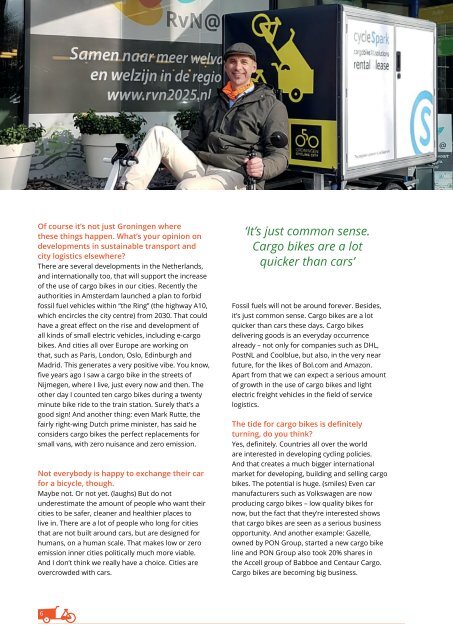Create successful ePaper yourself
Turn your PDF publications into a flip-book with our unique Google optimized e-Paper software.
Of course it’s not just Groningen where<br />
these things happen. What’s your opinion on<br />
developments in sustainable transport and<br />
city logistics elsewhere?<br />
There are several developments in the Netherlands,<br />
and internationally too, that will support the increase<br />
of the use of cargo bikes in our cities. Recently the<br />
authorities in Amsterdam launched a plan to forbid<br />
fossil fuel vehicles within “the Ring” (the highway A10,<br />
which encircles the city centre) from 2030. That could<br />
have a great effect on the rise and development of<br />
all kinds of small electric vehicles, including e-cargo<br />
bikes. And cities all over Europe are working on<br />
that, such as Paris, London, Oslo, Edinburgh and<br />
Madrid. This generates a very positive vibe. You know,<br />
five years ago I saw a cargo bike in the streets of<br />
Nijmegen, where I live, just every now and then. The<br />
other day I counted ten cargo bikes during a twenty<br />
minute bike ride to the train station. Surely that’s a<br />
good sign! And another thing: even Mark Rutte, the<br />
fairly right-wing Dutch prime minister, has said he<br />
considers cargo bikes the perfect replacements for<br />
small vans, with zero nuisance and zero emission.<br />
Not everybody is happy to exchange their car<br />
for a bicycle, though.<br />
Maybe not. Or not yet. (laughs) But do not<br />
underestimate the amount of people who want their<br />
cities to be safer, cleaner and healthier places to<br />
live in. There are a lot of people who long for cities<br />
that are not built around cars, but are designed for<br />
humans, on a human scale. That makes low or zero<br />
emission inner cities politically much more viable.<br />
And I don’t think we really have a choice. Cities are<br />
overcrowded with cars.<br />
‘It’s just common sense.<br />
<strong>Cargo</strong> bikes are a lot<br />
quicker than cars’<br />
Fossil fuels will not be around forever. Besides,<br />
it’s just common sense. <strong>Cargo</strong> bikes are a lot<br />
quicker than cars these days. <strong>Cargo</strong> bikes<br />
delivering goods is an everyday occurrence<br />
already – not only for companies such as DHL,<br />
PostNL and Coolblue, but also, in the very near<br />
future, for the likes of Bol.com and Amazon.<br />
Apart from that we can expect a serious amount<br />
of growth in the use of cargo bikes and light<br />
electric freight vehicles in the field of service<br />
logistics.<br />
The tide for cargo bikes is definitely<br />
turning, do you think?<br />
Yes, definitely. Countries all over the world<br />
are interested in developing cycling policies.<br />
And that creates a much bigger international<br />
market for developing, building and selling cargo<br />
bikes. The potential is huge. (smiles) Even car<br />
manufacturers such as Volkswagen are now<br />
producing cargo bikes – low quality bikes for<br />
now, but the fact that they’re interested shows<br />
that cargo bikes are seen as a serious business<br />
opportunity. And another example: Gazelle,<br />
owned by PON Group, started a new cargo bike<br />
line and PON Group also took 20% shares in<br />
the Accell group of Babboe and Centaur <strong>Cargo</strong>.<br />
<strong>Cargo</strong> bikes are becoming big business.<br />
6






